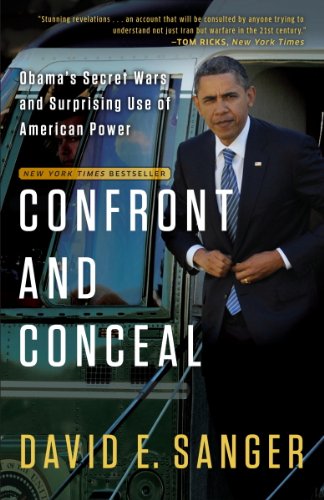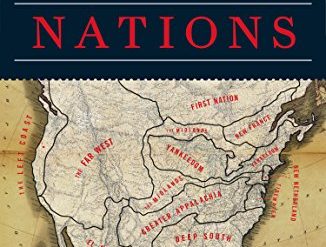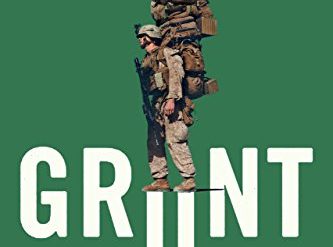
When I voted for Barack Obama in 2008, I expected a great deal from his Presidency — much too much, it’s clear in hindsight. What I didn’t expect was that as President he would exercise U.S. military power almost as aggressively as George W. Bush. As the subtitle of this excellent book hints so broadly, the apparently anti-war candidate Obama quickly morphed in office into a resolute, hands-on Commander in Chief. I expected peace. What I got were secret wars.
In his campaign, Obama had “promised to restore traditional American ‘engagement’ by talking and listening to America’s most troubling adversaries and reluctant partners. His supporters saw a welcome turn away from the ‘with us or against us’ black-and-whites of the Bush years. His critics saw naivete and softness. Both have been surprised. This is a book about those surprises.”
Confront and Conceal: Obama’s Secret Wars and Surprising Use of American Power by David E. Sanger ★★★★★
In practice, Obama learned that his brand of engagement yielded little more than vitriolic rhetoric from Iranian mullahs, North Korean generals, and the Pakistani military. What has proved far more effective are the actions he could take consistent with his more sophisticated view of American power:
- a massive increase in drone strikes in Pakistan, Yemen, and Somalia;
- the country’s first-ever (known) use of cyberwarfare in a targeted attack on Iran’s nuclear program, along with increasingly brutal sanctions on the country and its government;
- the ever-growing use of Special Forces in operations such as the murder of Osama bin Laden;
- and a pronounced “pivot” from Europe to Asia in combating the rise of China, as exemplified by the opening of a new military base in Australia.
While ending U.S. participation in our “war of choice” in Iraq and beginning the pullout from Afghanistan, President Obama has sharply stepped up our use of the weapons of war in a growing number of undeclared and sometimes undercover hostilities.
Make no mistake about it: Barack Obama has made an idelible mark on the U.S. military and intelligence services, sharpening their missions and reshaping their priorities, and all while forcing them to live within more limited means. And anyone who might be tempted to think that Obama acted this way out of weakness needs to understand the great extent to which he made decisions at crucial times in the face of opposition from nearly all those around him — in giving the green light to the Navy SEAL mission to kill bin Laden, and in deciding to ask Hosni Mubarak to resign. As Sanger writes, “‘He personally basically overrode just about his entire government,’ said one official in the room, noting that Gates and Clinton were still actively opposed, ‘Look, this is what I’m going to do,’ Obama said, according to notes of the meeting. ‘I’m going to call [Mubarak] now.'”
All this, and more, comes to light in the five sections that form the backbone of this book. Sanger writes about each of the leading hotspots in turn: Afghanistan and Pakistan; Iran; Egypt; China; and North Korea. This is truly world-class reporting, informed by sources at the very highest levels of the U.S. government.
The unknown future of the Obama Doctrine
Sanger concludes, “It is too early to know if the emerging Obama Doctrine — a lighter footprint around the world, and a reliance on coalitions to deal with global problems that do not directly threaten American security — will prove a lasting formula. His effort at ‘rebalancing’ away from the quagmires in the Middle East toward the continent of greatest promise in the future — Asia — was long overdue. But it is a change of emphasis more than a change of direction. Obama proved he was adaptable to new realities, what James Fallows rightly called ‘the main trait we can hope for in a president.'”
If you’ve ever wondered what it might be like to be a 30-year veteran of The New York Times and serve as its Chief Washington Correspondent, read this extraordinary book with an eye on those sources, both named and anonymous, and their revelations, which pop up seemingly on every page. You’ll see, then, how very deeply embedded in the fabric of official Washington is this one newspaper — a newspaper that serves as the source of an extraordinary proportion of the stories that make their way onto evening news broadcasts and the front pages of other papers around the world. In laying bare the pattern of Barack Obama’s surprisingly aggressive use of military power, Confront and Conceal is just as effective in revealing David Sanger’s unusually high-level access at the White House, the CIA, and the Pentagon.
For further reading
I’ve also reviewed The Afghanistan Papers: A Secret History of the War by Craig Whitlock (The lies they told us about the Afghanistan War).
This is one of the many good nonfiction books about national security reviewed here and of 20 eye-opening books about terrorism.
Like to read books about politics and current affairs? Check out Top 10 nonfiction books about politics (plus dozens of runners-up).
If you enjoy reading nonfiction in general, you might also enjoy:
- Science explained in 10 excellent popular books
- Great biographies I’ve reviewed: my 10 favorites
- Top 10 nonfiction books about politics
And you can always find my most popular reviews, and the most recent ones, plus a guide to this whole site, on the Home Page.



























